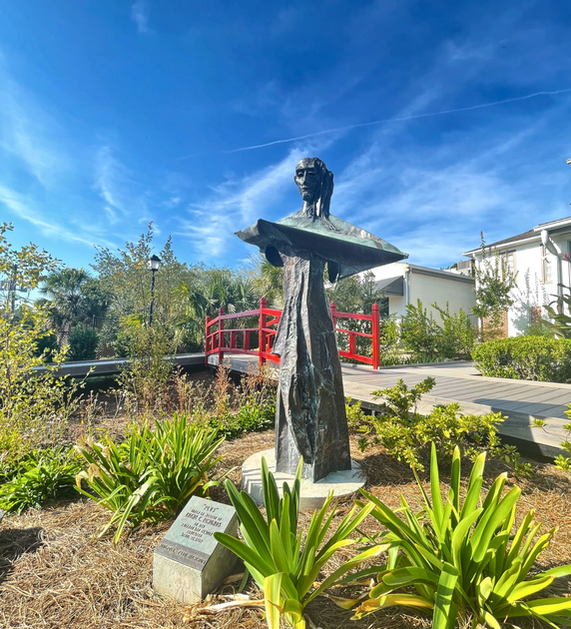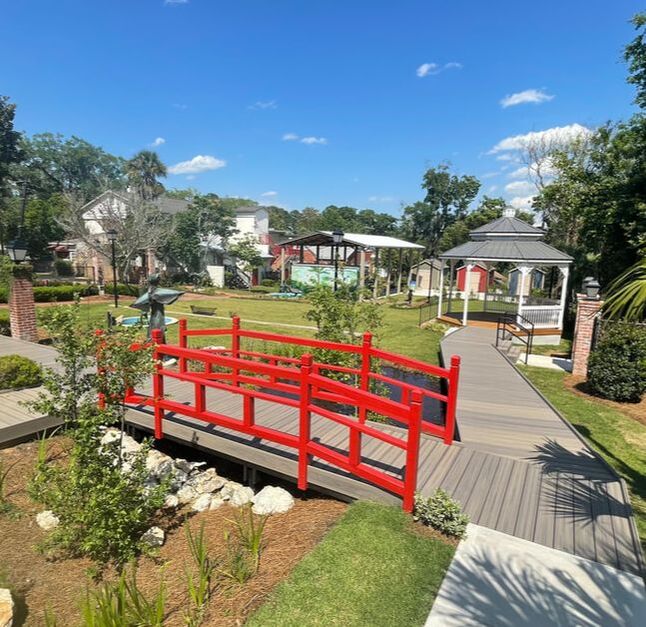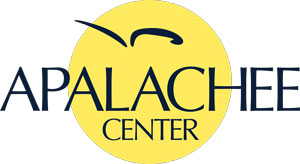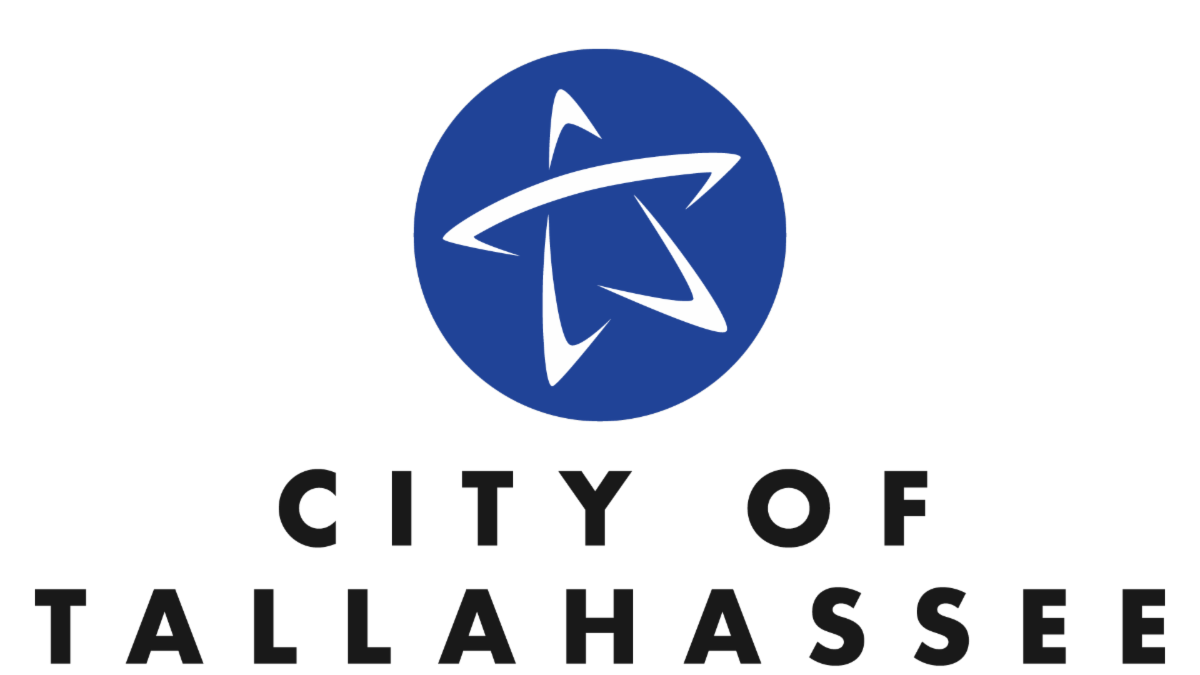|
In keeping with its long history of inclusion, LeMoyne Arts has launched its participation in the City of Tallahassee’s 200th Anniversary Celebration by dedicating its newly created “African American Tribute Garden” to those who were at the forefront of desegregation and the exercise of civil rights in Tallahassee.
In announcing the African American Tribute Garden, Stephanie Whitfield, LeMoyne Board President, said, "Being the first organization in the region to practice non-discrimination and celebrate inclusiveness, LeMoyne has a proud legacy of supporting civil rights. Through dynamic partnerships with community advocates, we are thrilled to shine a spotlight on this important work." Located within LeMoyne’s recently revitalized and expanded gardens and grounds, the African American Tribute Garden sits at the apex of the Unity Footbridge and the Lee and Ann D. Williams Pathway that runs between the Kathy and Ray Bye Grand Plaza and the Tommy Guilday Celebration Gazebo. It will be highly visible to the thousands of individuals and families who visit LeMoyne each year. "The African American Tribute Garden's theme is 'Together in the Struggle for Social Justice’ and the garden itself is foundational and essential to the full realization of LeMoyne's Art for Always master plan and its associated capital campaign," said Paula Fortunas, LeMoyne Board member and campaign chair. “This theme will be repeated in the recognition plaque to be installed in the garden and will carry the names of the people and families who engaged in the early days of the struggle and those who, in present day, have contributed to the garden project.” The fundraising goal is $20,000. The centerpiece of the African American Tribute Garden is the sculpture PLUS — created in 1969 by Florida State University professor and internationally renowned sculptor Fred Holschuh to honor and memorialize Irene Olivia Colbert Edmonds (1908-1968), a prominent Florida A&M University humanities and theatre professor. PLUS was donated to LeMoyne by Edmonds' family and friends. “Historically speaking, this may be the first instance of a sculptural installation dedicated to publicly recognize an African American hero in the Tallahassee Community," said Arielle Raff, LeMoyne’s Executive Director. Irene Edmonds was a pioneer in children's educational theatre. Among her many accomplishments in this field, she organized and directed Florida A&M University's Creative Children's Theatre, along with the University’s Playmakers Verse Choir. Under her guidance, the Creative Children’s Theatre reached national prominence, and in honor of Edmonds' work, the children's theatre is named the Irene C. Edmonds Youth Theatre. The Irene C. Edmonds Youth Camp (ICE Camp) also continues to this day with performances by the campers on July 11-13 on the Edmonds Stage in the Charle Winter Wood Theatre at Florida A&M University. Both Edmonds and her husband Randolph Edmonds were members of LeMoyne's Board of Directors. Their names will be among those inscribed on the African American Tribute Garden plaque. Special Fundraising Initiative LeMoyne's African American Tribute Garden fundraising initiative is chaired by Carol Neyland. A native Tallahassean, Neyland's parents were Dr. Joseph Awkard and Dr. Julita Awkard — both of whom were highly regarded members of the Florida A&M University faculty. Recently retired, Neyland’s career makes her highly qualified to lead this effort. She and her husband Franklin McMillion recently relocated to Tallahassee from Pittsburgh, PA, where Neyland had a distinguished career in the finance and banking industry specializing in community development, marketing, and financial planning. As a former participant in the children’s theater, Neyland remembers Irene Edmonds very well. "Once in our seats, you could hear a pin drop. She transported us into the world of theatre. We learned about what goes on behind the curtain: stage positions, how to read a play, the discipline to learn lines, and how to project not just our voices, but our self-worth.” Commenting on the fitting location of the Tribute Garden—which is adjacent to the Unity Footbridge—Neyland reflects: "Behind the scenes, the Edmondses built bridges for our community so that we could live in a fair and equal world, not just one located on the south side of town. Our parents were also building bridges in this quest for equal rights. It wasn't until 1963 when, at the age of 10, I was called upon to help desegregate Blessed Sacrament School, that I realized that the Edmondses and our parents tried to provide us with all the opportunities that were withheld from us,” continued Neyland, "and it seems it really does take a village to raise a child. With this in mind, it is fitting that, as we dedicate the African American Tribute Garden at LeMoyne and re-dedicate the PLUS sculpture to Mrs. Edmonds, we honor our parents, too." LeMoyne’s History of Inclusiveness "Those who founded LeMoyne in 1963 were determined to make it a fine arts gallery and venue for art education that was inclusive — welcoming all to participate and enjoy community through the arts," said Kelly Dozier, LeMoyne Board Lead Director. To underscore that determination, LeMoyne codified a non-discrimination clause in its original bylaws — the first private organization to do so. Clifton Lewis, one of LeMoyne’s founders, was recognized in 2014 by the City of Tallahassee as a Foot Soldier in the Footsteps to Freedom, thus acknowledging her participation in the local struggle to end racial inequality. Her name will be among those inscribed on the African American Tribute Garden plaque. Today, LeMoyne seeks to continue developing a diverse community around art experiences by having at least three exhibits each year that incorporate social issues addressed in art, by creating events that welcome all members of the community, and by pursuing diversity in hiring staff. LeMoyne is working to build more relationships with artists of color and to represent more artists of color. In furtherance of this objective, LeMoyne is launching the Studios of LeMoyne to build a community of working artists. LeMoyne is expanding its art camp scholarship fund and improving its art camp scholarship award process — including needs-based identification within the application. How to Support the Tribute Garden Project “The continued support and participation of the Tallahassee community is the key to making this African American Tribute Garden successful,” stated Neyland. “Their continued involvement and patronage are critical as LeMoyne Arts continues to grow, to increase in its diversity and outreach, and to move forward, creating community through art.” To learn more about contributing to the African American Tribute Garden project, please contact Arielle Raff at 850.222.8800 or [email protected] or Paula Fortunas at 850.933.2770 or [email protected]. Contributions by check may be mailed to: LeMoyne Arts, 125 North Gadsden Street, Tallahassee, Florida 32301. Please make checks payable to LeMoyne Arts and enter “African American Tribute Garden'' on the check's memo line. Or, to make a secure online donation, please visit www.lemoyne.org/ArtforAlwaysMasterPlan/DonateNow. Comments are closed.
|
Archives
April 2024
Categories |



 RSS Feed
RSS Feed













